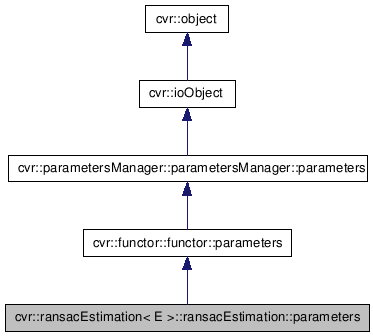

|
last update 20 Sep 2009 |
|
#include <cvrRansacEstimation.h>


Public Member Functions | |
| parameters () | |
| parameters (const parameters &other) | |
| ~parameters () | |
| parameters & | copy (const parameters &other) |
| parameters & | operator= (const parameters &other) |
| virtual parameters * | clone () const |
| virtual parameters * | newInstance () const |
| virtual const std::string & | name () const |
| virtual bool | write (ioHandler &handler, const bool complete=true) const |
| virtual bool | read (ioHandler &handler, const bool complete=true) |
Public Attributes | |
| int | numberOfIterations |
| bool | adaptiveContamination |
| int | numberOfCorrespondences |
| float | confidence |
| float | contamination |
| float | maxError |
| E::parameters | initialEstimationParameters |
| uniformDiscreteDistribution::parameters | rndParameters |
| cvr::ransacEstimation< E >::ransacEstimation::parameters::parameters | ( | ) |
| cvr::ransacEstimation< E >::ransacEstimation::parameters::parameters | ( | const parameters & | other | ) |
Copy constructor.
| other | the parameters object to be copied |
Reimplemented from cvr::functor::functor::parameters.
| cvr::ransacEstimation< E >::ransacEstimation::parameters::~parameters | ( | ) | [virtual] |
| virtual parameters* cvr::ransacEstimation< E >::ransacEstimation::parameters::clone | ( | ) | const [virtual] |
| parameters& cvr::ransacEstimation< E >::ransacEstimation::parameters::copy | ( | const parameters & | other | ) |
Copy the contents of a parameters object.
| other | the parameters object to be copied |
| virtual const std::string& cvr::ransacEstimation< E >::ransacEstimation::parameters::name | ( | ) | const [virtual] |
| virtual parameters* cvr::ransacEstimation< E >::ransacEstimation::parameters::newInstance | ( | ) | const [virtual] |
Returns a pointer to a new instance of the parameters.
Implements cvr::functor::functor::parameters.
| parameters& cvr::ransacEstimation< E >::ransacEstimation::parameters::operator= | ( | const parameters & | other | ) |
Copy the contents of a parameters object.
| other | the parameters object to be copied |
| virtual bool cvr::ransacEstimation< E >::ransacEstimation::parameters::read | ( | ioHandler & | handler, | |
| const bool | complete = true | |||
| ) | [virtual] |
Read the parameters from the given ioHandler.
| handler | the ioHandler to be used | |
| complete | if true (the default) the enclosing begin/end will be also written, otherwise only the data block will be written. |
Reimplemented from cvr::parametersManager::parametersManager::parameters.
| virtual bool cvr::ransacEstimation< E >::ransacEstimation::parameters::write | ( | ioHandler & | handler, | |
| const bool | complete = true | |||
| ) | const [virtual] |
Write the parameters in the given ioHandler.
| handler | the ioHandler to be used | |
| complete | if true (the default) the enclosing begin/end will be also written, otherwise only the data block will be written. |
Reimplemented from cvr::parametersManager::parametersManager::parameters.
| bool cvr::ransacEstimation< E >::ransacEstimation::parameters::adaptiveContamination |
Flag for automatic adjustment of the degree of contamination after each successfull guess.
The contamination is only decreased and never increased. This parameter has a direct effect on the number of iterations performed. The functor will always terminate after at most the maximum numberOfIterations is reached, though.
If adaptive contamination is turned on, the apply-methods return true even if the detected inliers suggest a contamination above the parametrized contamination.
Default: false.
| float cvr::ransacEstimation< E >::ransacEstimation::parameters::confidence |
The number of trials in adaptive mode depends on the estimated contamination and the confidence, under which the result is correct.
Default: .99
| float cvr::ransacEstimation< E >::ransacEstimation::parameters::contamination |
The expected degree of contamination.
This is the part of the total correspondences that is assumed to be contaminated.
Default: .5
| E::parameters cvr::ransacEstimation< E >::ransacEstimation::parameters::initialEstimationParameters |
Some estimators allow configurations that you may want to control explicitelly.
These are the parameters set to the basic estimator before any computations are made.
| float cvr::ransacEstimation< E >::ransacEstimation::parameters::maxError |
The maximum error for a single correspondence or the averaged size of the residual.
Default: .8f
| int cvr::ransacEstimation< E >::ransacEstimation::parameters::numberOfCorrespondences |
The number of correspondences drawn at each trial to estimate the transformation.
Literature advises to use the minimum number correspondences that are required which is proved optimal under a statistical context.
The minimum number of correspondences required to estimate a transformation can be obtained with C=(dof()+1)/2 (assuming integer division), where dof() is a method provided in the interface of the estimators. If the number provided here is less than that minimum C, then C is used instead.
Default: -1 (always use the minimum number of correspondences)
| int cvr::ransacEstimation< E >::ransacEstimation::parameters::numberOfIterations |
Maximal number of iterations used while trying to converge to a solution.
Default: 50
| uniformDiscreteDistribution::parameters cvr::ransacEstimation< E >::ransacEstimation::parameters::rndParameters |
Parameters for uniform discrete distribution.